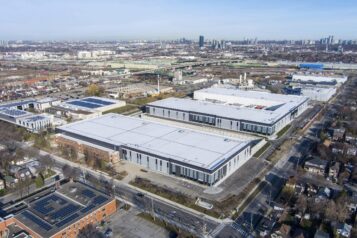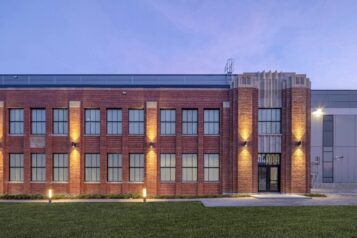
Construction is complete on The Birmingham, an historic Campbell Soup factory site redeveloped as a three-building facility to accommodate light industrial and E-commerce uses in the South Etobicoke district near downtown Toronto, Canada. Ware Malcomb provided architecture design services for the 398,000-square-foot project. General contracting services were provided by Leesswood Construction.
Owned by QuadReal Property Group, the three new buildings range from 157,710 to approximately 120,000 square feet, each with 36-foot clear heights. The buildings feature flexible floorplans that can accommodate a variety of uses, while outdoor spaces are carefully configured to facilitate efficient logistics use. The site provides a total of 86 loading docks and 80 truck-level doors, proximity to several highways and is less than 5 kilometers from Downtown Toronto.
Frank Di Roma, regional vice president, Ware Malcomb’s Canadian region, said the client’s objective was restoring the site’s economic and cultural importance in the community, while preserving its history and art deco architecture. “The factory was one of the anchors of what became one of Toronto’s first major employment districts during the 1930s. This project introduces high-quality modern facilities in an ideal location, enabling businesses to reach more than 5 million customers within a 60-minute drivetime radius.”
Di Roma said the client was committed to make the streetscape attractive to the surrounding community and screen truck loading operations from the residential housing nearby, which drove a challenging aspect of the site design. “Significant attention was focused on the grade differences on the site, the design of retaining walls and associated earthwork,” he said. “A truck court interior to two of the buildings is sunk four meters below grade, while building façades shield the other truck loading area.” In addition, the southern façade of the historic factory was preserved and incorporated into one of the new buildings, which helps retain the character of the site and the surrounding neighborhood.
To contribute to sustainability in the commercial space and reduce tenants’ carbon footprint, The Birmingham is designed with several green features, including solar panel rooftops, EV charging stations and solar electric power. Concrete was used in the truck courts to reflect sunlight and reduce urban heat island effects, while the exterior is heavily landscaped.
Photos by Philip Castleton




 Join our thriving community of 70,000+ superintendents and trade professionals on LinkedIn!
Join our thriving community of 70,000+ superintendents and trade professionals on LinkedIn! Search our job board for your next opportunity, or post an opening within your company.
Search our job board for your next opportunity, or post an opening within your company. Subscribe to our monthly
Construction Superintendent eNewsletter and stay current.
Subscribe to our monthly
Construction Superintendent eNewsletter and stay current.